U.S. 2nd Infantry Division Will Not be Transformed Into Rapid-Reaction Force
U.S. 2nd Infantry Division Will Not be Transformed Into Rapid-Reaction Force
Posted August. 02, 2004 22:09,
It was reported that the U.S. 1st brigade of the 2nd Infantry Division, which will stay in Korea after the reduction of the U.S. Forces in Korea (USFK) scheduled for late next year, is likely not to take a role of a rapid-reaction force which can be involved in disputes in East Asian countries. Therefore, it is expected that the USFK will not leave Korea on a large scale for military operations in other areas outside the Korean peninsula.
A high official in the Ministry of National Defense said on August 2 that a Unit of Action (UA) is quite different from Stryker, which assumes the role of a rapid-reaction force
as he quoted the U.S. suggestion at the meeting of the 10th Future of the ROK-U.S. Alliance Policy Initiative (FOTA) that it would transform the 1st brigade of 2nd Infantry Division into a UA.
Up to now, related people within and outside the military had been worrying that the U.S. 1st brigade of the 2nd Infantry Division might be reorganized for military operations for disputes in East Asian countries by being transformed into a Stryker unit as part of the U.S. worldwide military realignment plan. The Ministry of National Defense appreciates that a UA creates more stress on regional defense functions for specific areas such as the Korean peninsula even though it has both rapid-reaction and regional defense functions. For this purpose, each UA is broadly equipped with related military equipment such as artillery, aviation, and reconnaissance assets.
A high official in the Ministry of National Defense said that he evaluates this proposal from the U.S. is positive for Korea, stating that a UA in Korea doesnt have to go to hotspots in East Asia in a situation that U.S. forces in Japan are being reinforced.
A military expert in Korea said that a UA is armed with stronger firepower and equipment, which cannot be easily carried, than those of the division level, in contrast to Stryker units with lighter weapons and equipment. He added that the U.S. core fighting power will stay in Korea in order to operate heavy weapons and cutting-edge arms in Korea.
In the meantime, it was reported that the U.S. didnt change its policy of reducing the USFK by 12,500 soldiers by late next year, even though Korea asked to postpone the reduction time at the 10th FOTA meeting.
The Ministry of National Defense plans to discuss with the U.S. about the realignment problem of the U.S. 1st Brigade of the 2nd Infantry Division and the time and scale of the USFK reduction at the 11th FOTA meeting to be held in Seoul from August 19 to 20.
Ho-Won Choi bestiger@donga.com
Headline News
- Yoon removed from office by unanimous court decision
- Constitutional Court mentions responsibility of both Yoon and National Assembly
- Won-dollar rate falls to 1,430 range after impeachment ruling
- Teacher with spinal cord injury transforms into career counselor
- U.S. redeploys Patriot missiles from S. Korea without replacement forces







